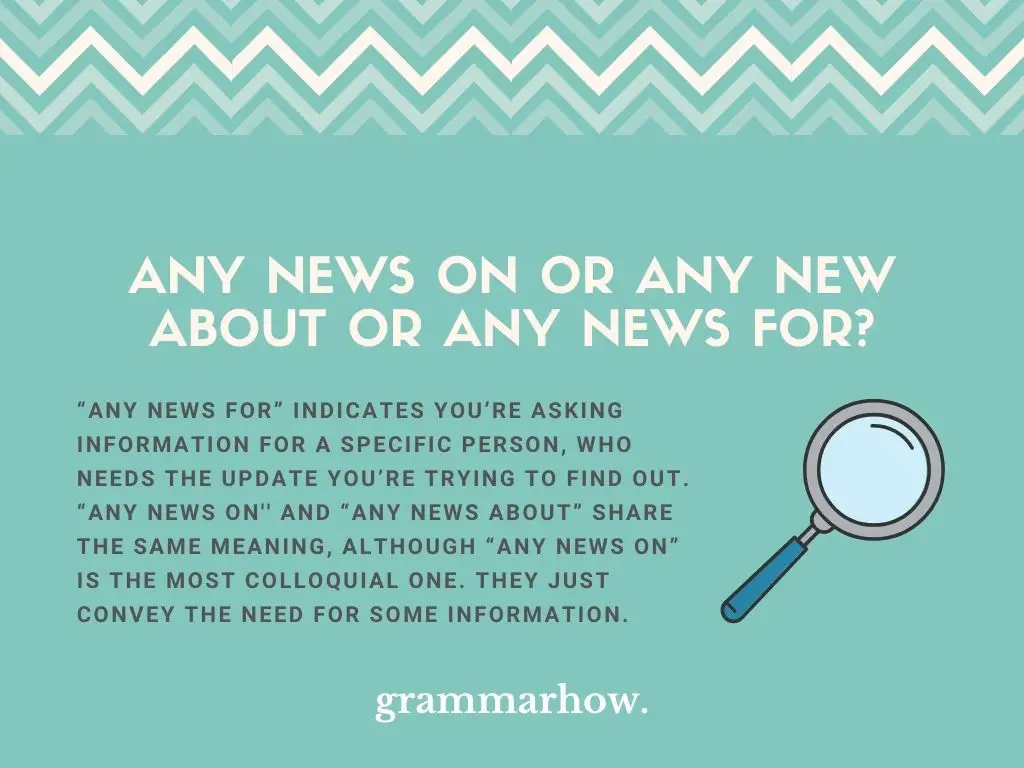Sometimes we just need to have an update on what’s going on around us. When you do, do you ask for “Any News On”, “Any News About”, or “Any News For” something?
All three forms seem to be quite common. Let’s find out what’s the correct use for each.
Any News On or Any New About or Any News For?
“Any News For” indicates you’re asking information for a specific person, who needs the update you’re trying to find out. “Any News On” and “Any News About” share the same meaning, although “Any News On” is the most colloquial one. They just convey the need for some information.

Keep in mind that all three forms, “Any News On”, “Any News About”, and “Any New For” are grammatically correct. You just have to be careful applying them to any sentences, to make sure you convey the message you wish to. We’ll take a look at each separately, to understand better.
Take a look at some examples, before we move forward:
- Any news on the patient’s condition?
- Any news about the patient’s condition?
- Any news for the patient’s family, about their condition?
The first two sentences carry the same meaning, despite using “Any News On” and “Any News About”. The message in both questions is the same, and would yield an appropriate response, in the search for news.
The third sentence, by using “Any News For” indicates a person or group of people (in this case, the family members) need an update. So the question about the news is form them, with the purpose of satisfying their need to know more.
Any News On
“Any News On” indicates the speaker wishes to obtain an update on the situation at hand. This is the most informal, casual way to ask these questions. Therefore this form should be avoided in more formal, polished environments.
If you choose to use “Any News On” this is what your sentence would look like:
- Any news on that new prototype?
- Lainey is asking the doctors if they have any news on her mother’s condition.
- Does the design team have any news on the website’s development?
- Is there any news on TV I should be aware of?
- Any news on Terry’s response to our invitation?
Note that in all of these sentences, the important point is that an update is needed on a certain subject. It’s not so much about the people involved, or who’s asking. It’s about the subject that’s being discussed or addressed.
Any News About
“Any News About” carries the same meaning as “Any News On”. The difference is in tone, because “Any News About” is a more classic, traditional way to ask the question. You should use it, whenever your speech must sound more polite and polished.
In that scenario, those would be some examples of “Any News About” in a sentence:
- Is there any news about how Marissa is doing?
- Kyle asked me if there’s any news about the project.
- Unfortunately, there is no news about how your father is doing.
- Do we have any news about the project Jim’s involved with?
- Have you heard any news about what happened to Sam and his dog?
Just like the sentences on the examples for “Any News On”, the sentences here indicate the desire to obtain an update on a subject, a situation at hand. To whom the information is given isn’t important, as much as the content of the update itself.
Any News For
“Any News For” is used when the update is meant for a specific person. In that case, the news is being asked for a particular person (or group of people) and they are as important as the news itself.
This is how to the use of “Any News For” would look like in a sentence:
- Do you have any news for me?
- Does anyone have any news for the boss about the delay?
- Is there any news for Mark about his package?
- We’re still waiting for any news on the patient.
- Janet is asking if Donald has any news for her.
“Any News For” indicates that whoever is asking, or whoever the answer is addressed to, is as important as the update. When we say “any news for the boss” we indicate that the leader of the team wants answers, and anyone who responds to him should have them immediately.
Any News Of
“Any News Of” carries the same meaning and intention as “Any News On” and “Any News About”. However, it’s the most traditional form, despite being considered to be obsolete by many.
Surprisingly, and maybe because it’s been around for so long, it’s still very much in use. Keep in mind only that this is the most classic way to ask for news, so it might not work so well in informal, colloquial environments.
This is what “Any News Of” in a sentence would look like:
- Any news of the app’s interface development?
- Is there any news of Ripley’s condition?
- There hasn’t been any news of him since he left last week.
- We haven’t heard any news of him in a while.
- We haven’t heard any news of our newest recruit, which is weird.
If you compare “Any News On”, “Any News About” and “Any News Of”, even with the same meaning, those forms range differently in the classic scale.
In other words, if you’re trying to be informal and casual, use “Any News On”. If you’re trying to be very formal and polished, go for “Any News Of”. And if you find yourself somewhere in between, go for “Any News About”.
Which Is Used the Most?
All forms remain very much in use, and sound quite common to most of us. But when we look at their frequency, what will we find? The the graph from Google Ngram Viewer below will show us:

“Any News Of” is by far the most common form, followed at a distance by “Any News About”. Of the three that have similar meaning, “Any News On” is the least used.
“Any News For” is at the bottom of the four. And we think it makes sense.
Because “Any News For” asks for information for a specific person (or group of people), and not just information for all in general, it’d be expected that this form would be less frequent, when compared to the others.
Final Thoughts
When trying to obtain an update for yourself or anyone specific, use “Any News For”. When asking in general, think about how formal or informal you need to be: “Any News On” on the informal end, “Any News Of”, on the formal end, and “Any News About” somewhere in between.
u may also like:
“In The News” or “On The News”? Correct Version (+Examples)
“A Good News” or “Good News”? Correct Version (+Examples)
“Is There Any News” or “Are There Any News”? (Correct Version)
What Is the Full Form of NEWS in English?

Martin holds a Master’s degree in Finance and International Business. He has six years of experience in professional communication with clients, executives, and colleagues. Furthermore, he has teaching experience from Aarhus University. Martin has been featured as an expert in communication and teaching on Forbes and Shopify. Read more about Martin here.
